- Home
- Terry Goodkind
Warheart: Sword of Truth: The Conclusion Page 16
Warheart: Sword of Truth: The Conclusion Read online
Page 16
“You wrote all these books?” Kahlan asked.
“Oh my no,” he said with a short chuckle. “I work with these books, record into them, but they predate me by many centuries. They contain the work of a long line of scribes who came before me, going back several thousand years, almost to the time when the citadel was built, I believe. All of it is recorded here. As did those before me, I have worked at this my entire life. Since I was young I have entered new prophecy in these books, most of that time for Bishop Arc.”
Knowing what he knew about prophecy, Richard was having a hard time believing that these books of recorded prophecy were the source of Hannis Arc’s knowledge and power. Prophecy, especially what he suspected was more folklore than true prophecy, could not provide that level of expertise.
“How do you choose which book to record these new prophecies in?” Nicci asked the scribe. “Was that also your job, to decide where they belong?”
He looked somewhat puzzled by the question. “They are categorized and then recorded according to their subject. I record them in the proper book for the subject contained in the prophecy.”
Richard shared a look with Nicci before he gazed out over the books lying open all over the room. “I was just starting to organize the prophecies at the People’s Palace. But it takes a true prophet to read the prophecy first and determine the proper subject.”
“Really?” Mohler asked, his eyes brightening. “I had no idea you were interested in such matters. Bishop Arc never cared much about the mundane aspects of my work. He only cared to read the new prophecies once I recorded them. Are there many books of prophecies there, at the People’s Palace?”
Richard arched an eyebrow. “The books in this room would not fill one small corner of one of the smaller libraries. There are a great many libraries there. Some of them, by themselves, as large as this citadel.”
Mohler’s eyes widened. “Really? I would love to see such a sight one day.”
“I hope that someday you can,” Richard said. He frowned, getting to what he really wanted to know. “Why aren’t the prophecies here recorded by chronology, rather than subject? Chronology is ultimately what matters. After all, a prophecy is irrelevant if it’s about an event that took place a thousand years ago, or will take place thousands of years from now. You need to know where a prophecy fits in time to know if it is relevant to what is happening today. Prophecy can only be linked, and more importantly put in context, if it can be placed chronologically.”
Mohler looked befuddled. “I rarely have any way of determining chronology, Lord Rahl, so I must instead use the subject as the category. That is how it has always been done.”
Richard didn’t want to tell the man right then and there that his life’s work had not only been misguided but was virtually useless. He couldn’t let it go entirely, either.
“The subject of the written words is misleading unless you are gifted and can confirm that the subject as written is actually related to the underlying prophecy. Are you gifted?”
Mohler touched a finger to his lower lip. “No, Lord Rahl. But I can read, so I know the subject.”
Richard shook his head. “The problem with that is that the words are not really the prophecy.”
The old scribe’s eyes widened. “They aren’t? But how can that be?”
“The meaning of the prophecy is hidden in a layer of magic beneath the words. What most people don’t understand is that the words are not actually the prophecy. They are only a trigger for the meaning of the real prophecy. A prophecy, for example, that says it will rain, may actually mean it will rain blood. Or a bounty of good crops. It takes a prophet to be able to see the vision of the real prophecy veiled by the words. The words are what trigger the vision, they don’t actually reveal it.”
Mohler looked about the room at his life’s work, seeming confused and lost, probably for the first time in his career.
“Even using the words,” Nicci said, “prophecy often contains references to a number of subjects. How do you determine which subject book to record them in?”
“I had to do the best I could, Mistress. I used my experience and judgment.” Mohler pointed. “For example, all the prophecy in that book is about the House of Rahl–a subject of great interest to Hannis Arc.” He looked up at Richard. “Do you mean to say that my entire life’s work is meaningless? That the categories are meaningless?”
Richard sighed as he looked around at the books lying open on pedestals. “I can’t say for sure. All I can tell you is that prophecy says I’m the one who is supposed to end prophecy–whatever that means. So, I guess that ultimately, if I’m successful, none of this will mean anything.”
“Isn’t that something,” Mohler whispered to himself as he stared at all the books as if seeing prophecy for the first time in a new light. “And to think, Bishop Arc spent so much of his life in here.”
What bothered Richard most was that if Hannis Arc didn’t help in the assignment of prophecy to particular books, that could only mean that the man wasn’t as interested in these prophecies as Mohler believed. Something else had been the focus of Hannis Arc’s attention and the source of his knowledge.
“The people who used all this didn’t really know what they were doing,” Nicci said, being more forward about it than Richard. “From what you say,” she told Mohler, “the things collected from anyone with the ‘talent for foretelling,’ means that most of this would be false prophecy.”
He looked alarmed. “False prophecy, Mistress?”
Nicci nodded as she looked around at the books. “True prophecy comes from wizards–prophets–not from country folk who imagine they have such talent and dream up prophecy. Those kind usually have a head full of predictions that come from dreams, wishes, fears, or most often their fertile imaginations.
“True prophets are wizards and wizards in this day and age are exceedingly rare. Prophecy among wizards is even more rare. Prophecy is meant to be read by others with the gift at least, and especially by other wizards who were gifted for prophecy. True prophecy is a specialty of wizards, not regular people.”
Mohler was frowning with concern. “You mean this in here is … not true prophecy?”
Nicci shrugged. “If you make enough predictions, eventually you will get one right, but that is by accident, not design. People focus on the one that turns out correct and from that give credibility to the others they believe have simply not yet come to pass, but forget about the hundreds or even thousands like them that have been forgotten because they have proven to be false.
“This looks to have become an obsession of a few in the beginning who didn’t really understand prophecy, and they passed on their beliefs in this kind of ‘prophecy’ to those who came after them. It’s akin to superstition, nothing more.
“At the Palace of the Prophets I worked for a great many years with the prophecy kept down in the vaults. It was prophecy written by wizards who were true prophets. I can tell you from experience that while there might be a few gems here, most of it is just common rocks.”
Richard was thinking the same thing. He wondered what Hannis Arc had really been doing in the room. If this prophecy was largely useless for the purpose and of little value, then how did Hannis Arc learn to raise Emperor Sulachan from the dead?
CHAPTER
26
Richard turned to the scribe. “Where did Hannis Arc work most of the time? You said that he spent a great deal of his time working in here. What did he do?”
Mohler shrugged uncomfortably. “I was not privy to exactly what it was he did. He did not discuss such matters with me–I was only his scribe. I do know, though, that he liked to study old documents. At least, that was what I most often saw him doing. I started early in the morning recording prophecy in the books, here, and he usually came in later. He did a lot of his work in here at night after I was gone.”
The old man lifted an arm out toward a large desk off to the side of the pedestals that held the books of prophe
cy. The disorderly desk was piled with everything from decorated bone objects and simple candlesticks to rulers and dividers to papers and stacks of old scrolls. A fat candle in a silver stand rested on top of a stack of worn ledgers. By the way layers of candle wax dribbled down all over one side of the ledgers, their importance appeared to have been nothing more than as a stand to elevate candles.
“Sometimes he would go over to the books and read prophecy I had recorded. I assumed that he did that when I was gone as well, but I can’t actually say for sure. I can’t say that I ever saw him paying close attention, though. I think he merely scanned them, looking for anything that might warrant more of his attention later.
“When I was here he occasionally liked to play chess”–the scribe gestured to a small stand with a board set with black and white game pieces–“over there.” He turned back. “Mostly, though, he worked there, at his desk.”
Standing behind the broad desk, Richard noticed that the closest pedestal, the one not far away on the other side of the desk, was the one holding the book that Mohler said contained prophecies about the House of Rahl. Just beyond that book of prophecy, rising up behind it, Hannis Arc would have had a good view of the stuffed bear standing up on its hind legs to tower over the book. The man probably liked the symbolism. In that light, the placement of objects in the room was beginning to make a little more sense.
Hannis Arc seemed to be a man fixated on symbology.
The books of prophecy around the room were immense, not only physically, but also in that there were collectively thousands upon thousands of pages contained in them. The thought of studying all of those books to try to find out what Hannis Arc had been up to, or to find a hint that might be helpful in stopping him, was daunting. Small numbers of prophecies were difficult enough to consider. The numbers here were overwhelming. But he didn’t think that prophecies collected in such a suspect manner were really what had occupied Hannis Arc.
Richard turned his attention back to the desk and unrolled a brittle, ancient-looking scroll lying to the side of the desk. The vellum was stained with what looked to be centuries of dirt and dark, ringed stains from mugs and candles used as weights to hold it open.
Richard was stunned by what he saw written in faded ink.
Nicci did a double take when she saw the look on his face. “What is it? What do you see?”
Richard could only stare at the scroll covered with a complex tapestry of lines connecting constellations of elements that made up the language of Creation. He moved to the side a little as Nicci and Kahlan rushed around the desk to have a look for themselves at what had captured his attention.
“That’s the language of Creation used by Regula,” Kahlan said. “The omen machine gives prophecies in that language.”
Richard nodded as he scanned the symbols, already trying to work out the translations. “It’s also the same language used by Naja Moon to leave messages in the caves in Stroyza.”
“I wonder if that means they date back to the time of the great war, the time when Naja and Emperor Sulachan were alive,” Kahlan said as she leaned in, frowning at the scroll Richard held spread open on the desk. “What does this say?”
Rather than answering her, he straightened and looked over at Mohler. “Are there any more of these scrolls? Ones written in this same language?”
Mohler stretched his neck to glance across the desk and look down at the scroll. He appeared to recognize it.
“Yes, there are some more of them.” He pointed. “There is another one of them, there, in that pile. It’s that darker one. Bishop Arc called them Cerulean scrolls.”
“Cerulean scrolls?” Richard asked. “You’re sure?”
“Yes, that’s right. He could read them, but I can’t. He spent a great deal of his time working with them. Whenever a new one came in he spent all his waking time with it for weeks, but that was a rare event. He was very protective of them.
“Years ago he used to study every detail of the new prophecies that I recorded for him. Although he would still come over from time to time and scan the newest entries I had made, over the years his interest in the books of prophecy dwindled until he became almost entirely focused on the scrolls.
“Sometimes he used those instruments on the Cerulean scrolls, doing some kind of measuring and such. If he worked late into the night and left them out, then in the morning when I came in I would put them away for him, but other than that I never had anything to do with them.”
Kahlan looked up from the scroll. “Do you know what ‘Cerulean’ means?”
Mohler shook his head. “That was what he called them, but he never told me the meaning of the word.”
“It’s an ancient word,” Richard said. “It means ‘celestial.’”
Nicci’s brow twitched. “Celestial?”
Richard grunted confirmation as he idly pinched his lower lip, deep in thought about the things he had seen in the room where Hannis Arc spent most of his time. The place contained dusty artifacts from ages ago, most appearing to predate Hannis Arc’s time. While the place was chiefly dedicated to cataloging and recording prophecy, the man hadn’t bothered to open all the newly arrived divinations. Since he apparently didn’t read them closely, it would seem that Hannis Arc wasn’t all that interested in prophecy. Or possibly he understood that the kind of ungifted prediction that arrived daily at the citadel was not true prophecy and largely useless.
It appeared that the Cerulean scrolls were the center of his focus. Richard wondered if perhaps Hannis Arc was only seeking out prophecy as a pretext to send people in what was really a search for scrolls or books written in the language of Creation. The Dark Lands, after all, seemed to be rich with history from the time of the great war. The caves at Stroyza were covered with information from that time.
“Sometimes,” Mohler said, “when I arrived in the morning to record prophecies that had come in overnight, Bishop Arc would still be in here working on a new Cerulean scroll and I would notice, then, that he had acquired more of those strange tattoos. Bishop Arc didn’t like me to speak unless spoken to, so I never asked about them. When we played chess I didn’t like to look upon those frightening symbols tattooed all over him.”
Nicci hooked a long lock of blond hair behind her ear as she leaned over to get a better look at the scroll on the desk. “Was he good at chess?”
Mohler nodded. “Oh yes. He was a master at it.”
“So then there are more of these kind of scrolls, with symbols like this one here?” Richard asked as he impatiently waved a finger at the scroll. “These Cerulean scrolls–there are more of them?”
Mohler seemed a little bewildered by Richard’s interest in old scrolls. “That’s right. Some are written in languages that are slightly different but are similar enough. All of them are kept over there.” He gestured to a cabinet against the stone wall. “Let me show you, Lord Rahl.”
The man shuffled across the room, weaving his way between a display of a family of stuffed beavers to one side, and a marble statue of a woman in a filmy robe that left nothing to the imagination on his other side.
Richard noticed that from his desk, Hannis Arc would not have been able to see the statue very well, but he would have had a clear view of the scene with the beavers, all busily at work chewing tree trunks and reducing them to sticks and small logs to use in their dam building so they could control the flow of a stream.
When he reached the cabinet, Mohler opened the tall, carved door to reveal a grid of cubbyholes, almost every one of them holding at least one scroll, some stuffed with several. They looked as ancient as the one on the desk. Many had dark, crumbling edges. A quick appraisal suggested that there were probably close to a hundred Cerulean scrolls in the cabinet.
Richard pulled one of them out and carefully unrolled it to have a look. It began with azimuth angles that he didn’t recognize. Those celestial observations, he suspected, were meant to show star positions. Richard wasn’t entirely sure how, but he suspected
that it might be a way of establishing chronology, a key element that prophecy lacked. In that light, the scrolls made prophecy look amateurish and incomplete. It seemed to have been an advanced technique, the mastery of which had been lost over time.
Right at the beginning, after the information about azimuth angles, Richard saw symbols that spoke about prophecy, except that they weren’t giving prophecy. Rather, they spoke of prophecy itself, almost as if it were a living thing.
In a strange way, they were revealing prophecy, but only in an oblique manner as they spoke of specific prophecies, using what they said to explain the central subject of the scroll. What, exactly, the subject of the scroll might be, Richard wasn’t entirely sure just yet.
Since in the language of Creation each of the symbols formed a complete concept, similar to an entire written sentence, rather than merely a word in a different language, it would take more time to work out the meanings of all the arcane symbols.
Richard rolled the scroll back up and handed it to Nicci. He pulled out another and opened it wide between his outstretched arms. This one, too, was written in symbols, and although the language was very similar it was not exactly the language of Creation. It was substantially the same, but more arcane, more primitive, written in a kind of less-formal slang. Richard felt a chill run through him at the realization that it seemed to be a language that predated the orthodox form of the language of Creation. A quick look was enough to tell him that he should at least be able catch the gist of it, if not translate it in its entirety.
As he scanned the symbols, they, too, appeared to be about prophecy, but in a different way. He frowned as he studied the scroll, trying to figure out what it was saying.
“Look there,” Nicci said, leaning in and pointing at a symbol. “Isn’t that the symbol for Regula?”
Richard blinked with the realization. “It certainly is.”

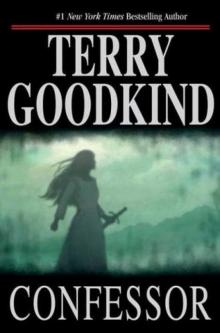 Confessor
Confessor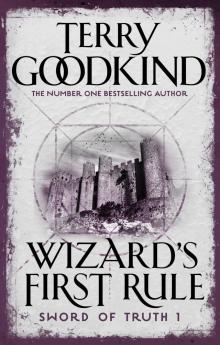 Wizard's First Rule
Wizard's First Rule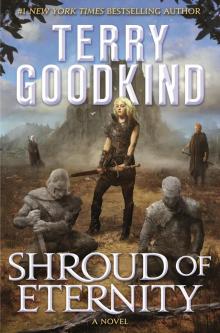 Shroud of Eternity
Shroud of Eternity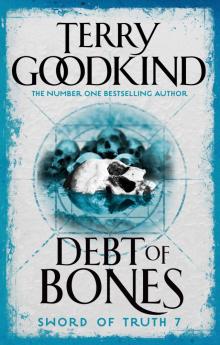 Debt of Bones
Debt of Bones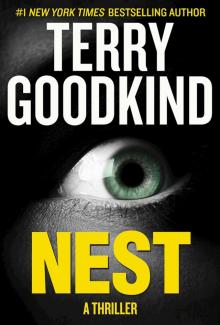 Nest
Nest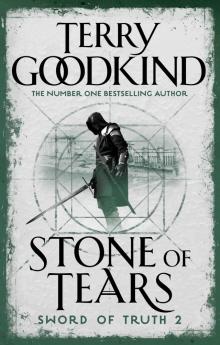 Stone of Tears
Stone of Tears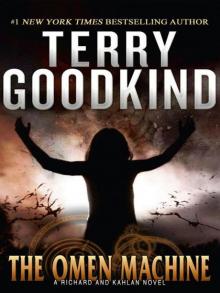 The Omen Machine
The Omen Machine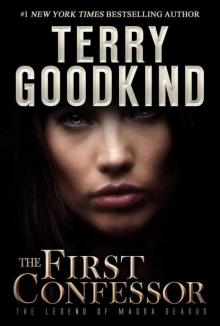 The First Confessor
The First Confessor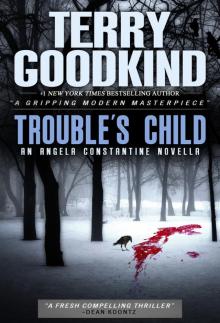 Trouble's Child
Trouble's Child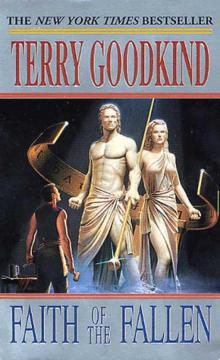 Faith of the Fallen
Faith of the Fallen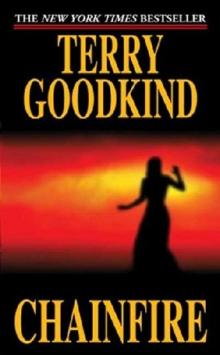 Chainfire
Chainfire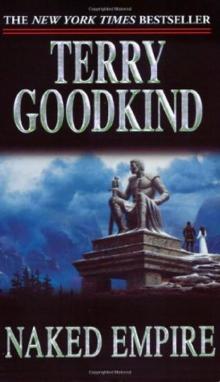 Naked Empire
Naked Empire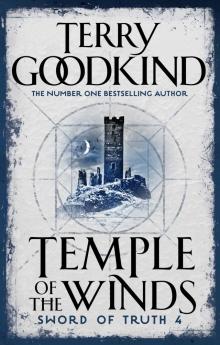 Temple of the Winds
Temple of the Winds Severed Souls
Severed Souls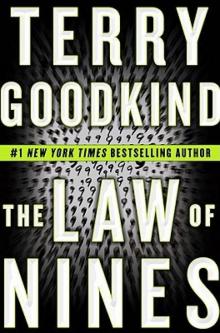 The Law of Nines
The Law of Nines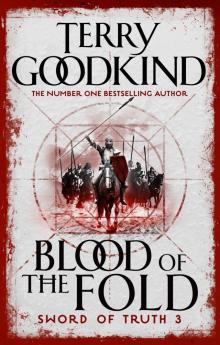 Blood of the Fold
Blood of the Fold Warheart: Sword of Truth: The Conclusion
Warheart: Sword of Truth: The Conclusion The Sky People
The Sky People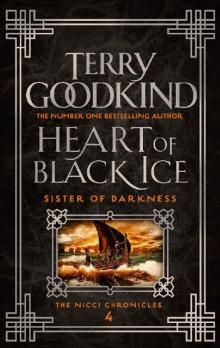 Heart of Black Ice (Sister of Darkness: The Nicci Chronicles Book 4)
Heart of Black Ice (Sister of Darkness: The Nicci Chronicles Book 4) Hateful Things
Hateful Things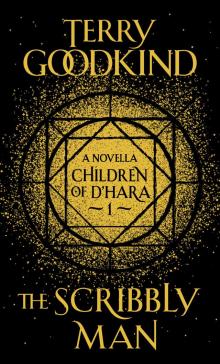 The Scribbly Man
The Scribbly Man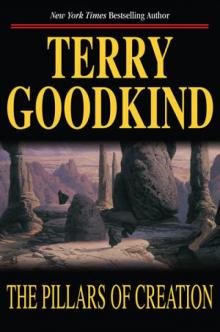 The Pillars of Creation
The Pillars of Creation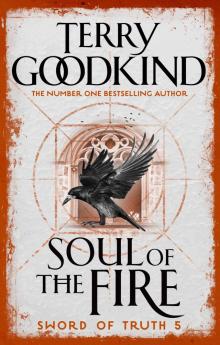 Soul of the Fire
Soul of the Fire Wasteland
Wasteland Heart of Black Ice
Heart of Black Ice Crazy Wanda
Crazy Wanda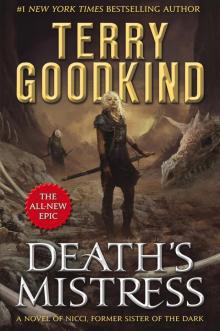 Death's Mistress
Death's Mistress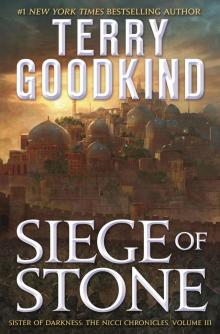 Siege of Stone
Siege of Stone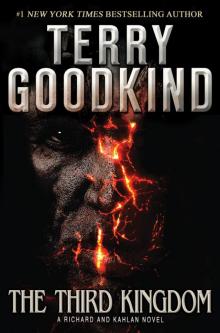 The Third Kingdom
The Third Kingdom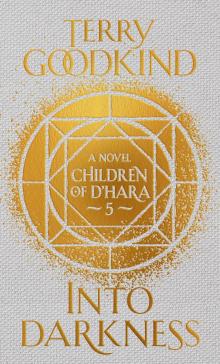 Into Darkness
Into Darkness The Girl in the Moon
The Girl in the Moon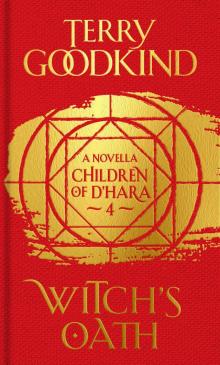 Witch's Oath
Witch's Oath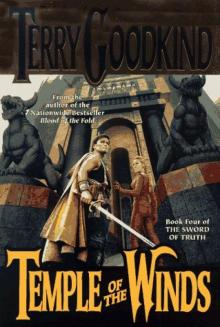 Temple of the Winds tsot-4
Temple of the Winds tsot-4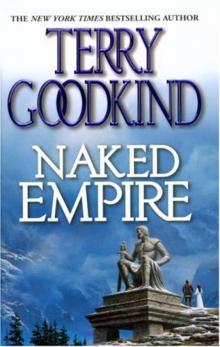 Naked Empire tsot-8
Naked Empire tsot-8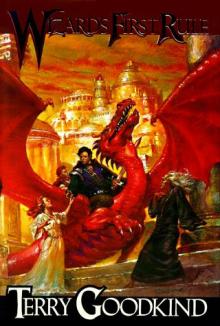 Wizard's First Rule tsot-1
Wizard's First Rule tsot-1 The First Confessor (The Legend of Magda Searus)
The First Confessor (The Legend of Magda Searus)![[Sword of Truth 9] - Chainfire Read online](http://i1.bookreadfree.com/i1/03/27/sword_of_truth_9_-_chainfire_preview.jpg) [Sword of Truth 9] - Chainfire
[Sword of Truth 9] - Chainfire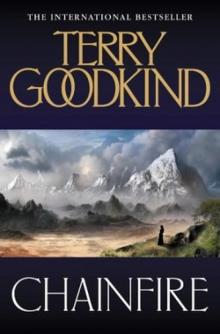 Chainfire: Chainfire Trilogy Part 1 tsot-9
Chainfire: Chainfire Trilogy Part 1 tsot-9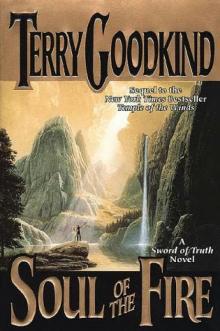 Soul of the Fire tsot-5
Soul of the Fire tsot-5 Pillars of Creation
Pillars of Creation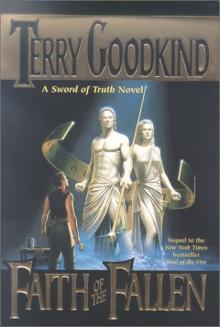 Faith of the Fallen tsot-6
Faith of the Fallen tsot-6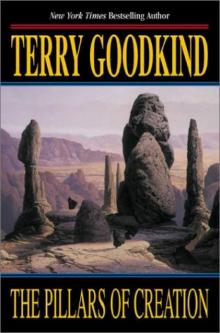 The Pillars of Creation tsot-7
The Pillars of Creation tsot-7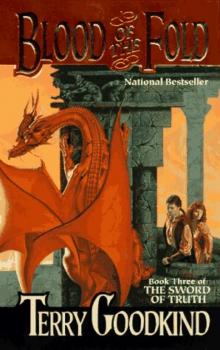 Blood of the Fold tsot-3
Blood of the Fold tsot-3 Warheart
Warheart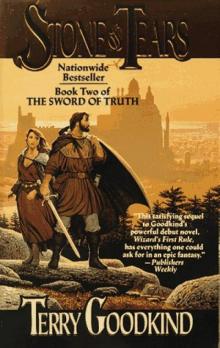 Stone of Tears tsot-2
Stone of Tears tsot-2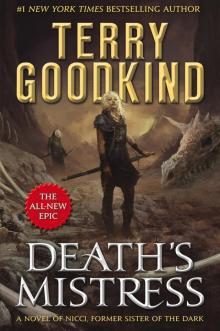 Death's Mistress--Sister of Darkness
Death's Mistress--Sister of Darkness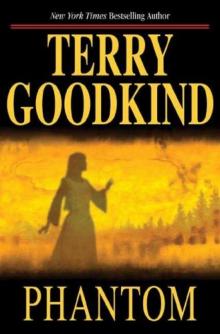 Phantom: Chainfire Trilogy Part 2 tsot-10
Phantom: Chainfire Trilogy Part 2 tsot-10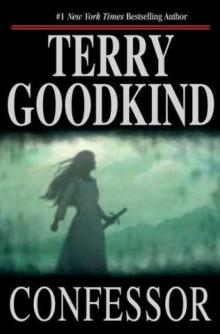 Confessor: Chainfire Trilogy Part 3 tsot-11
Confessor: Chainfire Trilogy Part 3 tsot-11